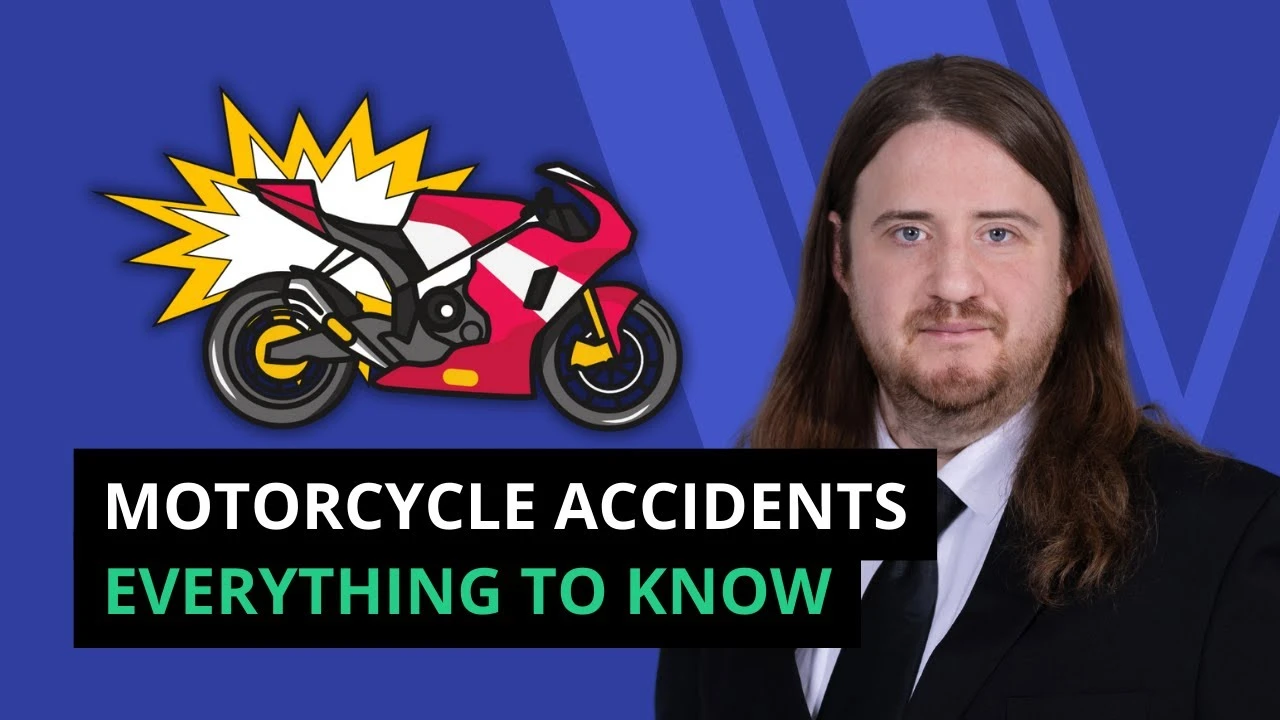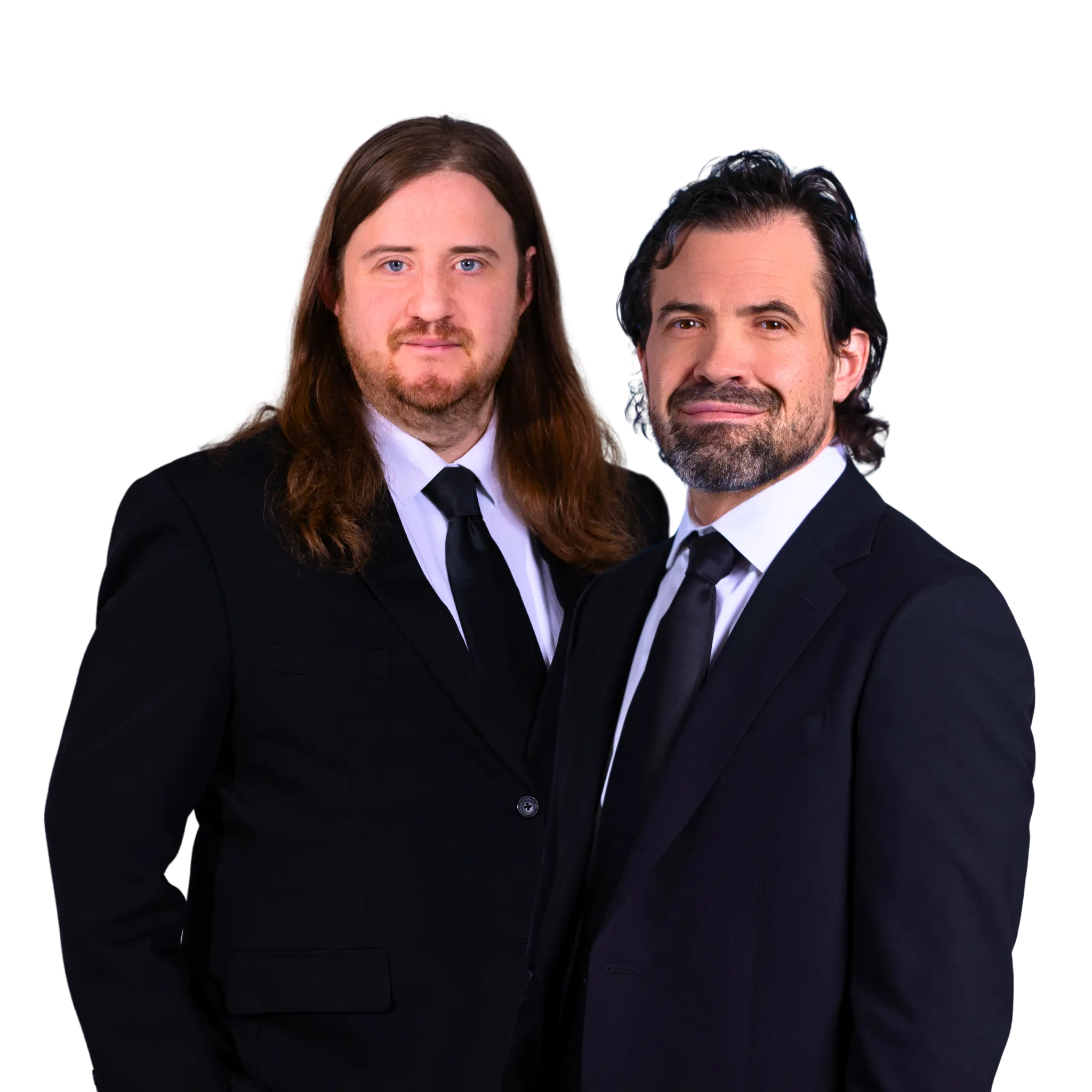Searching for experienced motorcycle accident lawyers in Nevada? Look no further than Wooldridge Law Injury Lawyers. We’re your premier choice, located in the heart of Downtown Las Vegas.
We offer free case evaluations, ensuring you understand your options without financial pressure. Our personalized approach means your case gets the attention it deserves. Insurance companies don’t intimidate us. Our motorcycle accident lawyers negotiate fiercely to secure fair settlements covering both economic and non-economic damages.
And if we can’t negotiate a settlement you’re satisfied with, we’re always prepared to take your motorcycle injury claim to trial. Whether you’re personally recovering from a motorcycle crash or seeking justice for a loved one, Wooldridge Law Injury Lawyers is here for you. Call us now so we help get your life back to normal.
on this page
Motorcycle accident lawyers in Nevada
Motorcycle accidents can change lives in an instant. Don’t let insurance companies minimize your suffering. Our experienced Las Vegas motorcycle accident attorneys are ready to fight for your rights and maximum compensation. Contact Wooldridge Law Injury Lawyers today for a free, no-obligation case evaluation. Let us handle the legal battle while you focus on recovery.
schedule a free consultationWhat should you do after a motorcycle crash in Las Vegas?
Immediately after a motorcycle accident, motorcyclists must take several steps. These steps will help ensure the biker’s safety and assess any injuries.
Ensure safety and check for injuries
Move to a safe location if possible. Perform a quick self-assessment for injuries. Assess yourself and others, remembering that adrenaline can mask pain. Check for visible wounds such as road rash, broken bones, or more severe conditions like spinal cord injuries or head injuries. In cases of serious injury, avoid moving the injured unless there’s an immediate danger, such as a fire.
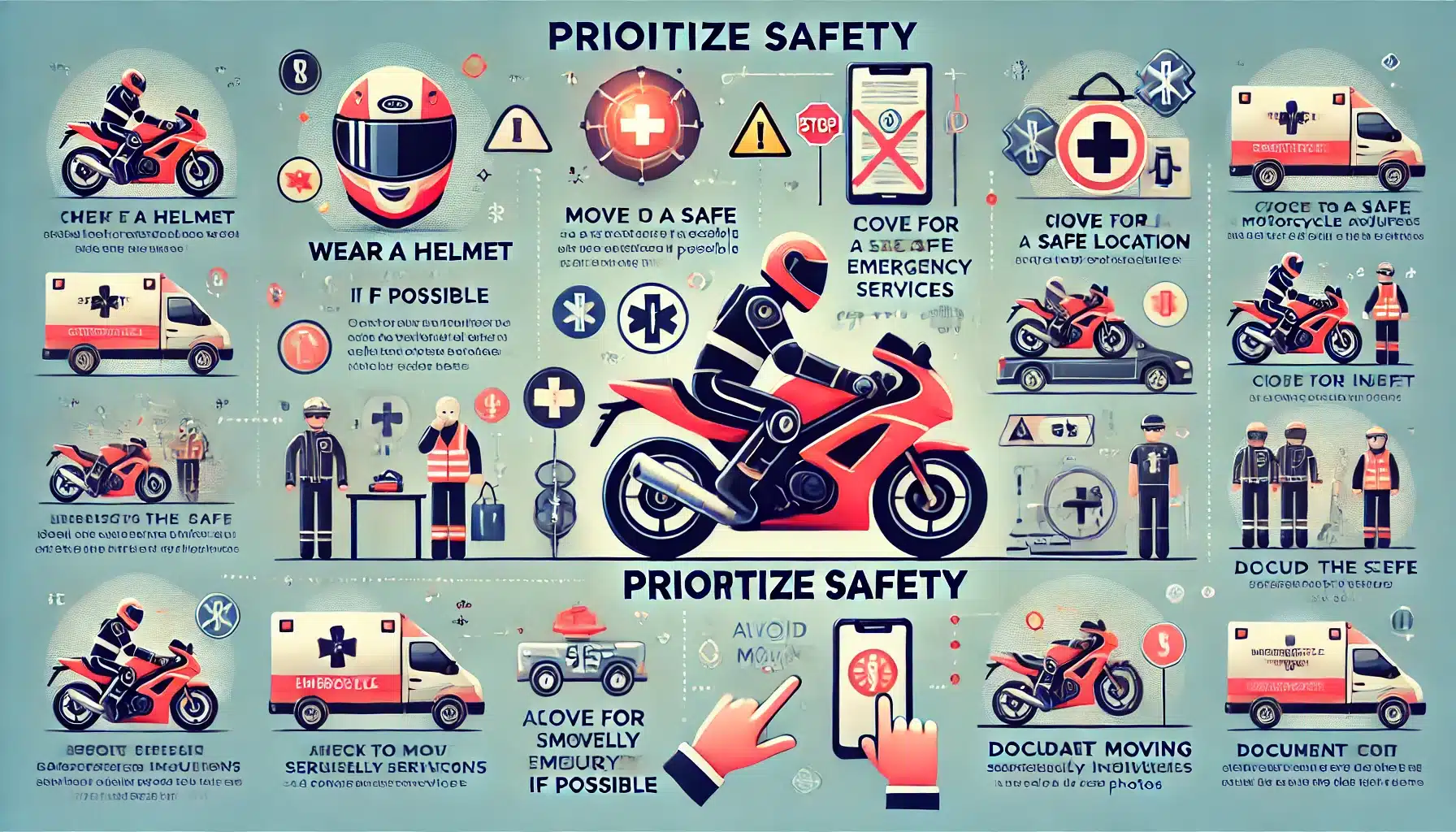
If you’re injured and unable to move, stay where you are and signal for help. Your safety and the safety of others should be your primary concern.

Call 911 Emergency Services
Dial 911 for police and medical assistance, even for minor accidents. A police report is crucial for insurance claims and potential legal proceedings. Provide clear information about your location and the severity of the situation.
Document the scene
Take photos and videos of the accident scene, including vehicles, injuries, and road conditions. Capture different angles and any relevant details like skid marks, traffic signs, or weather conditions. This evidence can be invaluable for your case later.
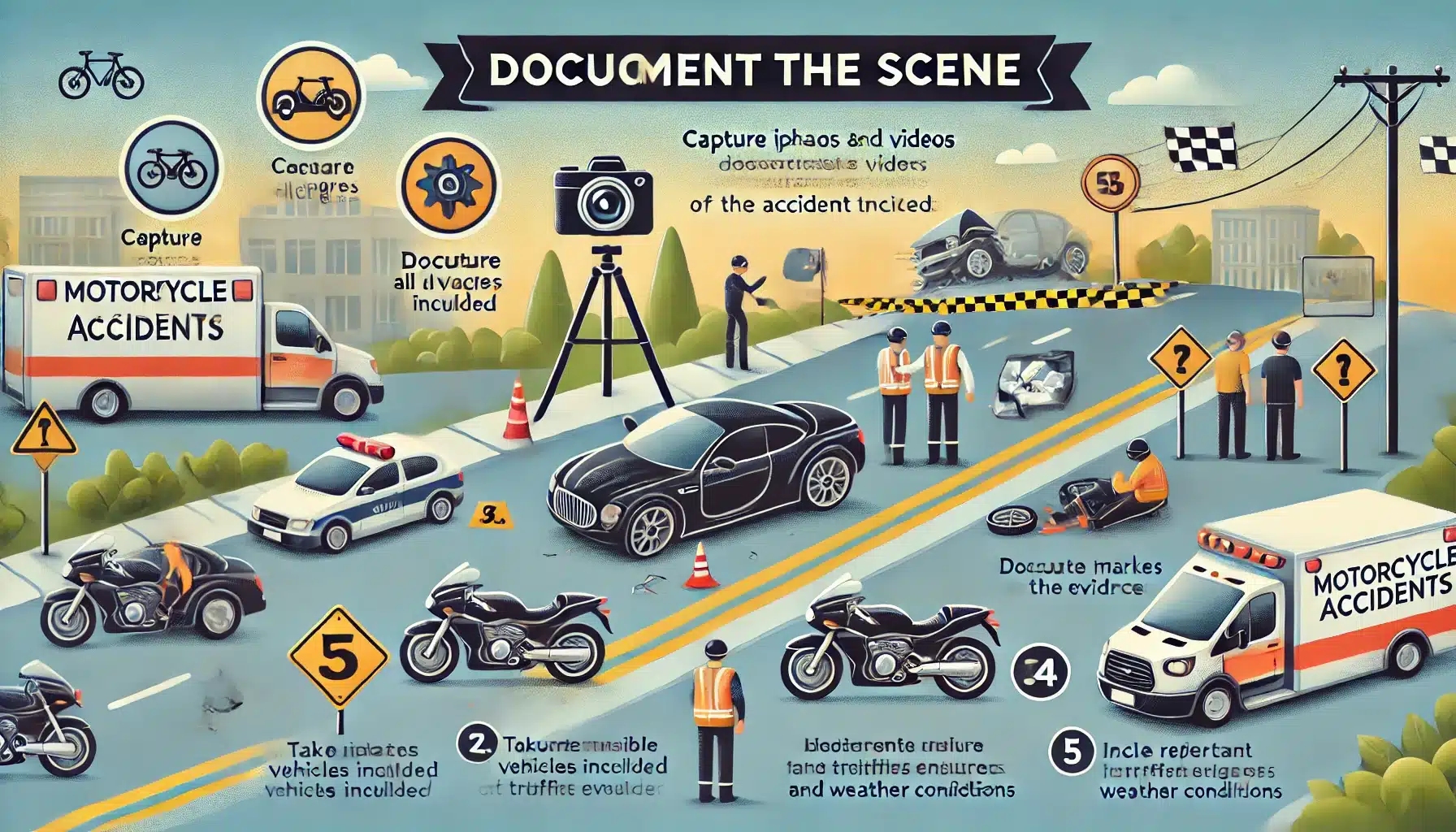
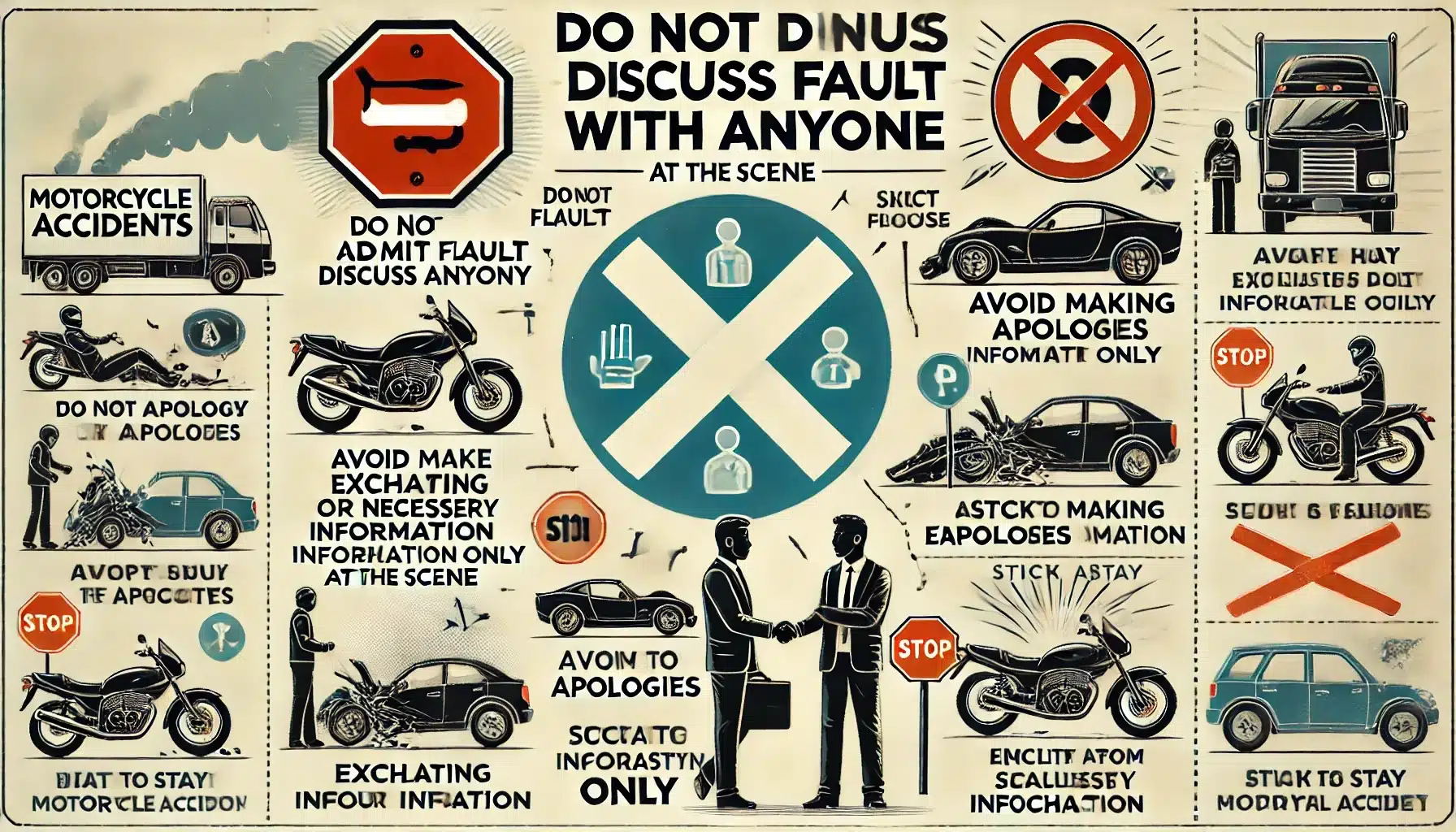
Do not discuss fault with anyone
Do not admit fault or discuss liability at the scene. Even a simple apology can be misconstrued as an admission of guilt. Stick to exchanging necessary information and avoid speculating about the cause of the accident.
Exchange contact information with drivers and witnesses
Collect contact and insurance details from all parties involved, including witnesses. Get names, phone numbers, addresses, insurance policy numbers, and vehicle information. If there are witnesses, ask for their contact information as well.
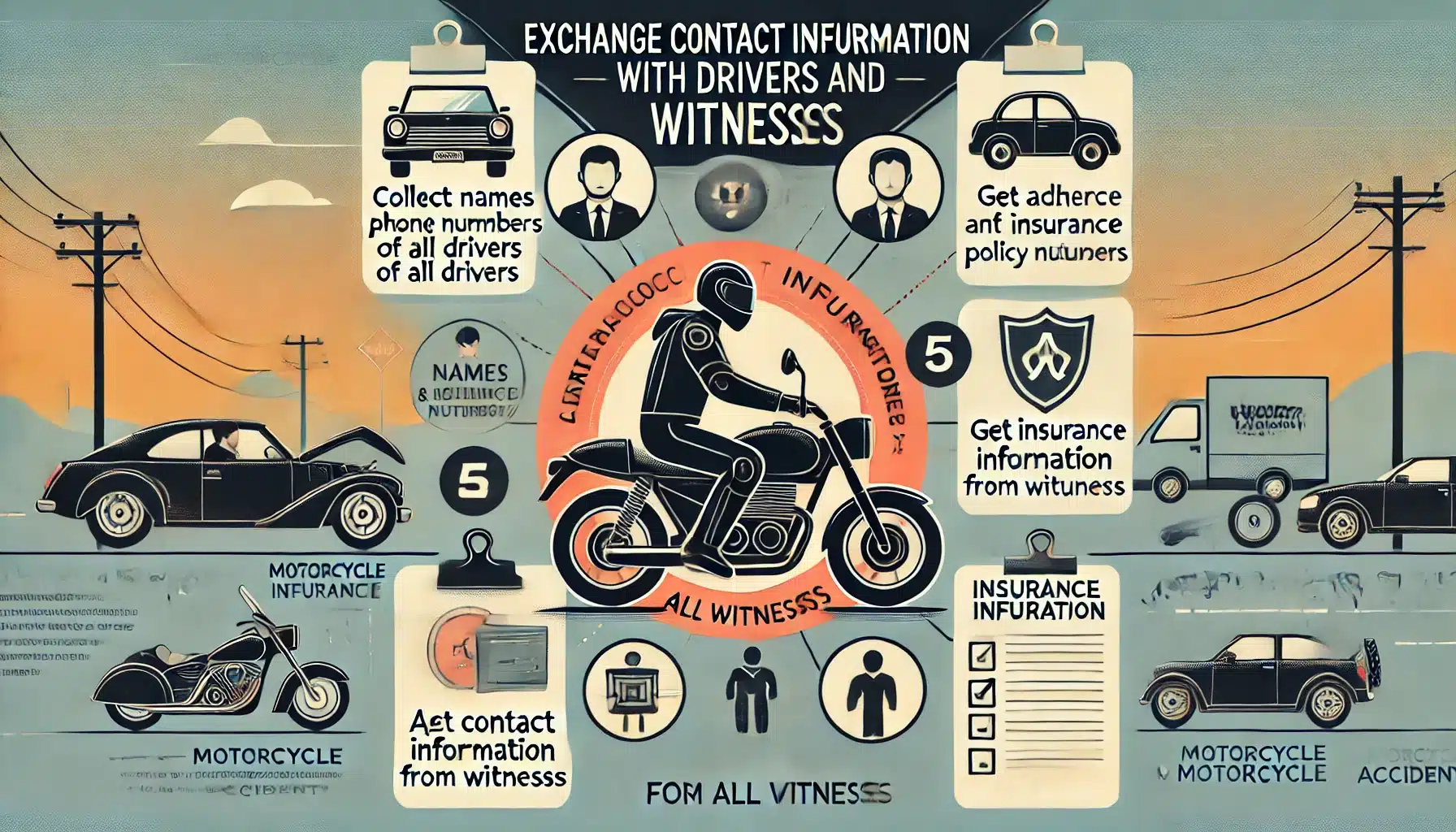
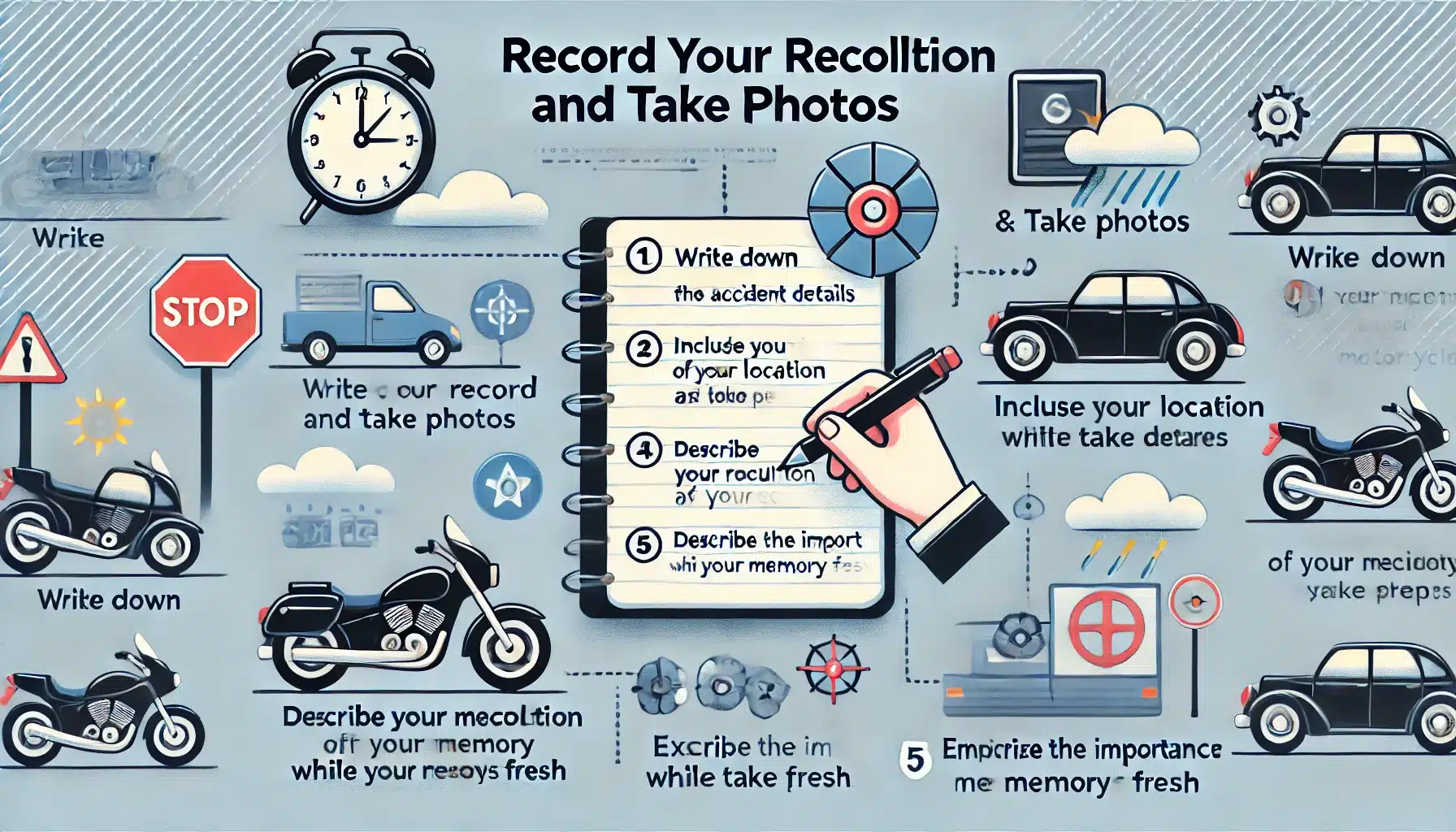
Record your recollection
As soon as possible, write down or record your memory of the accident details. Include the time, location, weather conditions, and your recollection of how the accident occurred. Your memory will be freshest immediately after the event, so don’t delay this step.
Look for witnesses and get their information
Gather contact information and any evidence from bystanders. This includes their name, phone number, and email address. If they saw what happened, ask them if they’re willing to give a statement or testimony about what they saw. If they’re not willing to give a statement, you can still ask them if they would be willing to provide their contact information in case your legal team needs to get in touch with them.

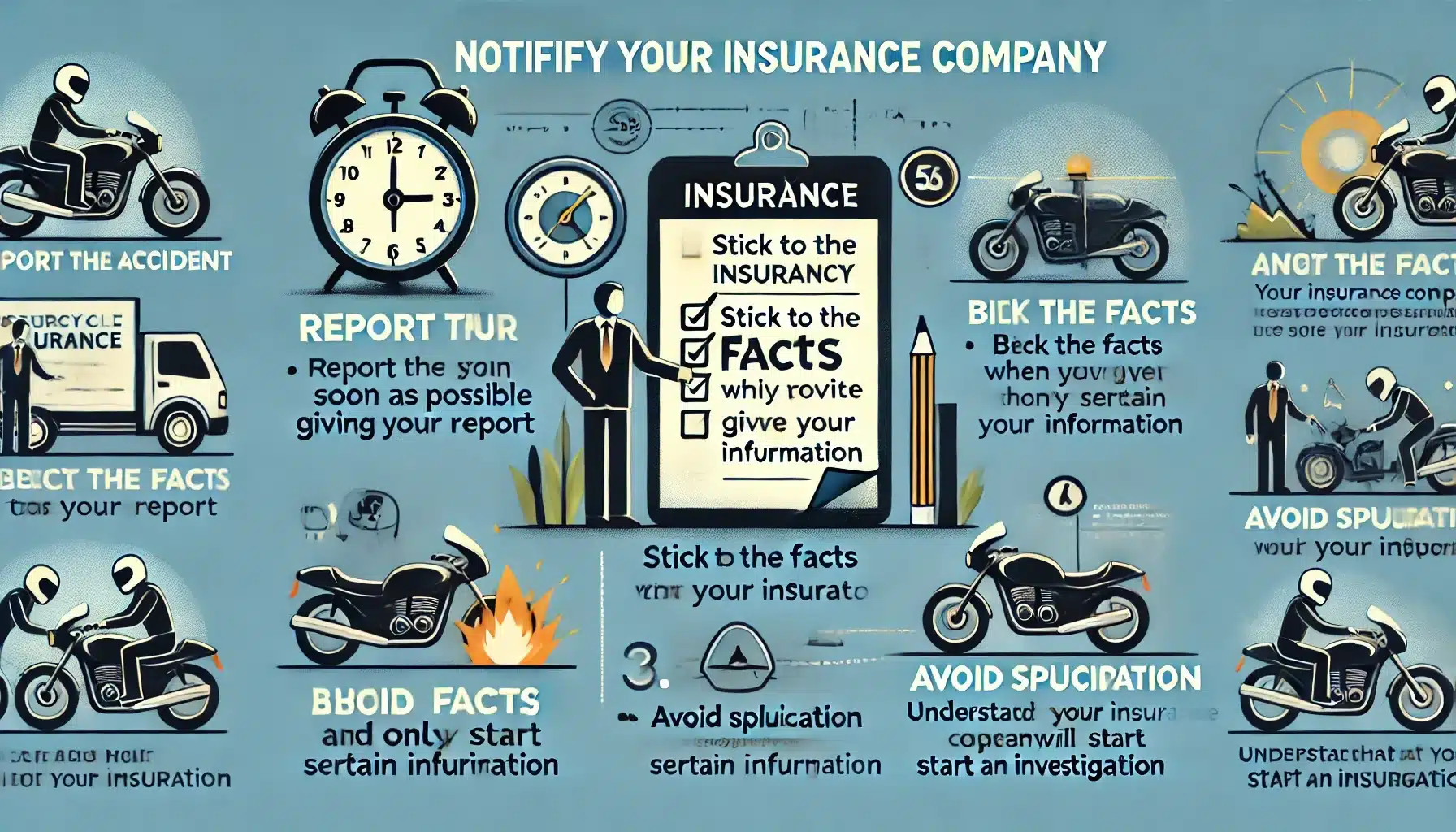
Notify your insurance company
Whenever you are in a motorcycle accident, you should report the accident to your insurer promptly, sticking to the facts. Be honest but concise in your report. Avoid speculation and only provide information you’re certain about. This is true whether you were at fault or not. Your insurance company will then begin an investigation, start the claims process, and ultimately determine who was at fault.
Seek medical attention
Get a thorough medical evaluation, even if you feel fine, and follow up as recommended. Some injuries, like whiplash or internal bleeding, may not be immediately apparent. Keep all medical records and follow your doctor’s advice for treatment and recovery.
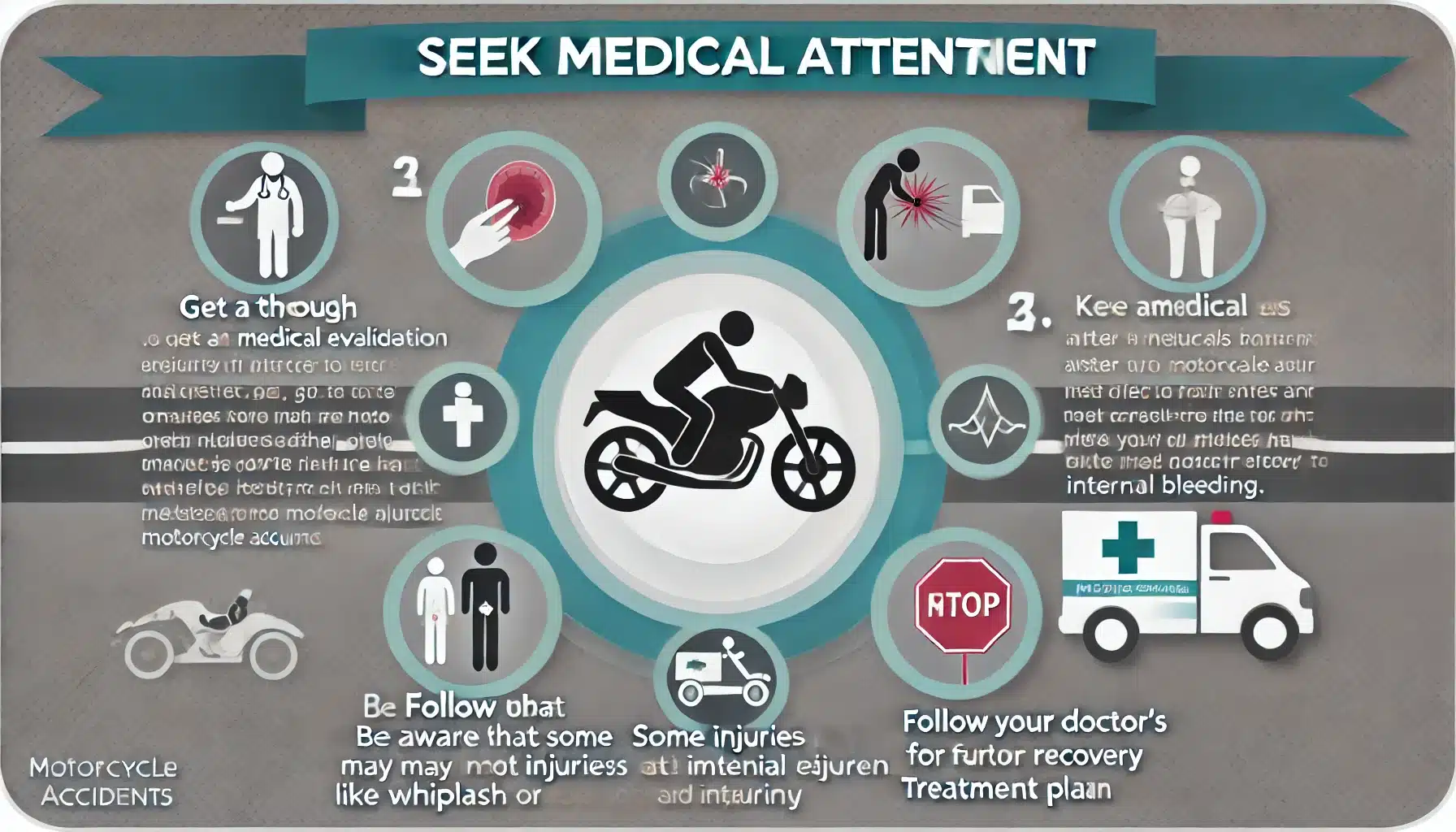
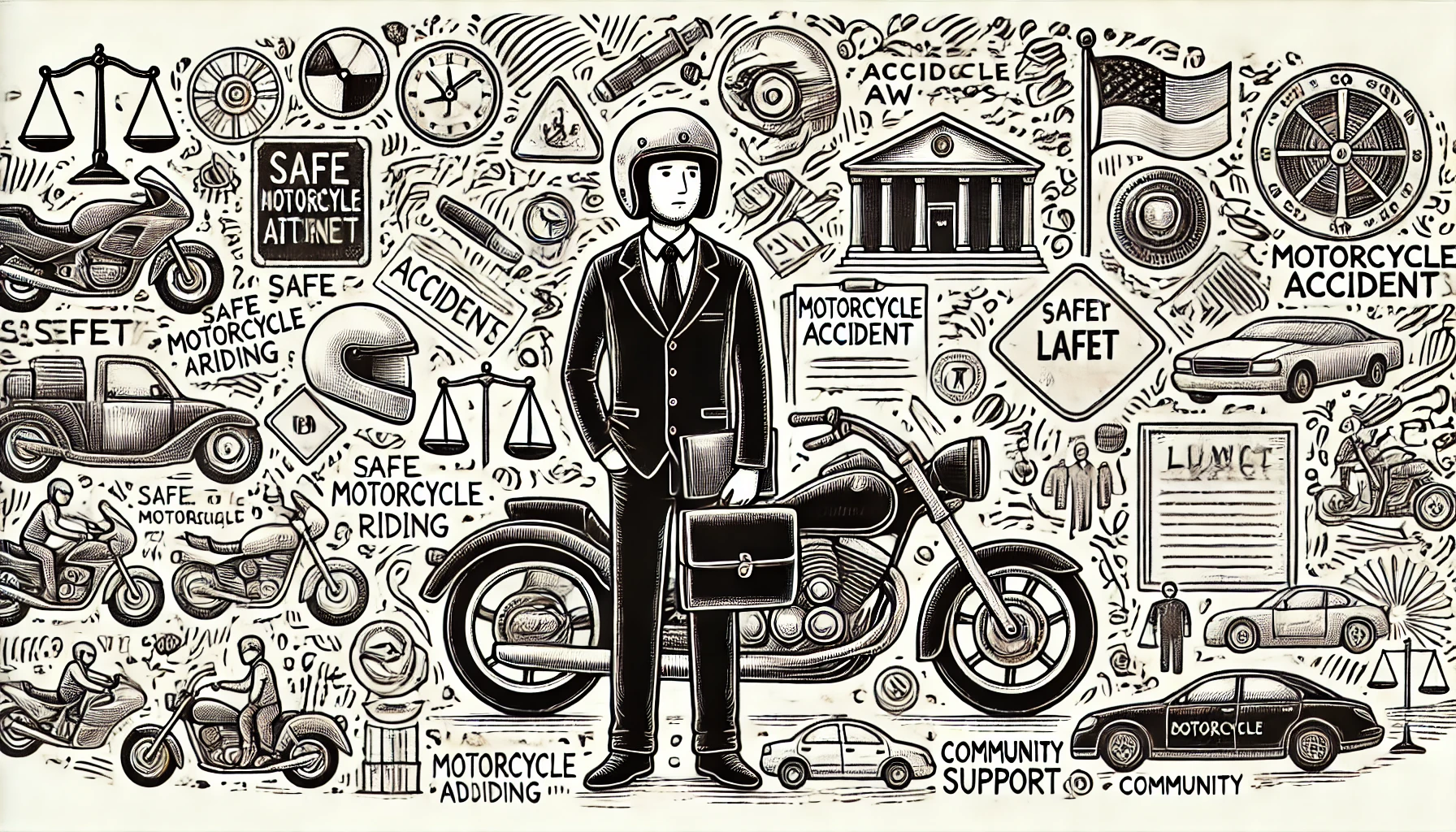
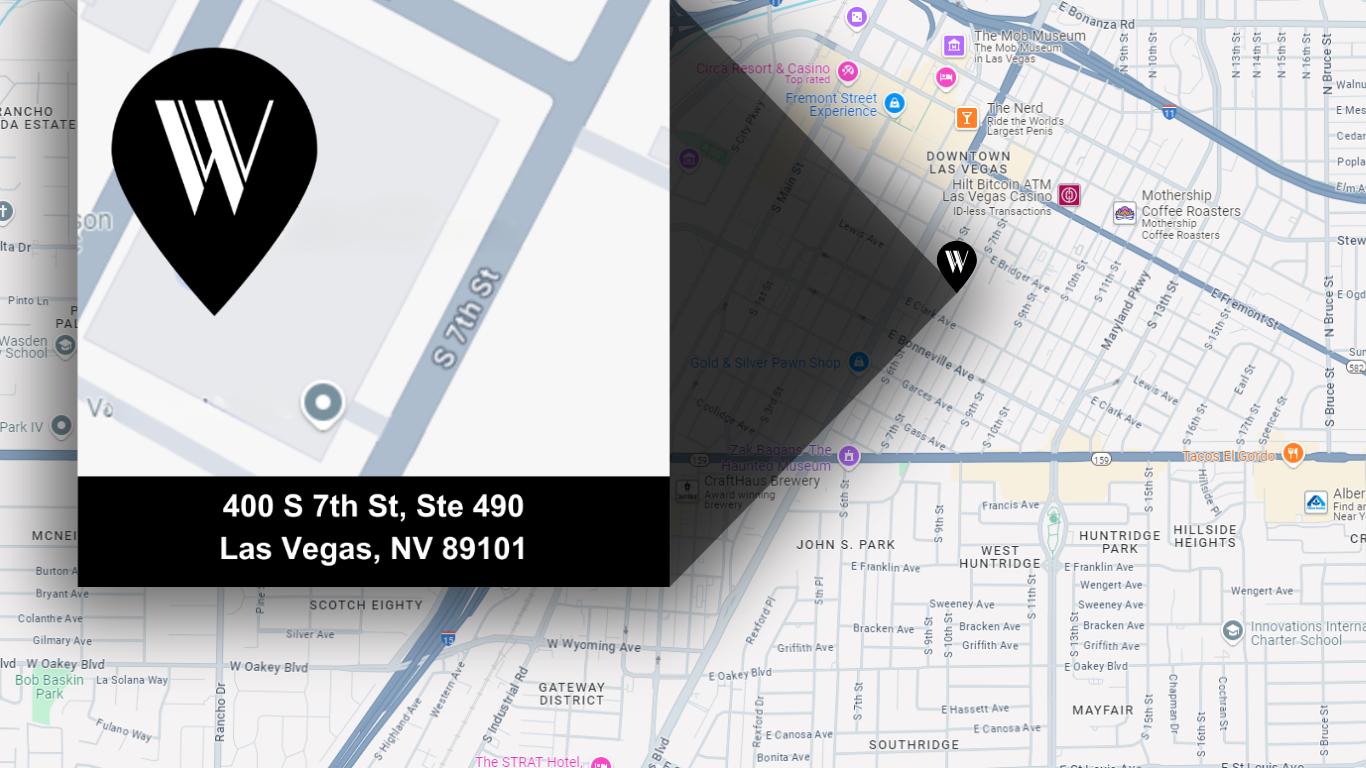
Visit our expert motorcycle accident lawyers near you in Las Vegas for a free consultation
If you’ve been involved in a motorcycle collision anywhere in Nevada, the team at Wooldridge Law Injury Lawyers is ready to assist. Our office at 400 S 7th St, Ste 490, Las Vegas, NV 89101 specializes in motorcycle accident cases. Unable to travel due to your injuries? We’ll come to you. Call (702) 867-8900 or contact us through our website to arrange a free case evaluation with a member of our team. Our Las Vegas motorcycle accident lawyers understand the unique challenges riders face and are committed to protecting your rights on and off the road.
Motorcycle Accident lawsuit process in Nevada
How to file a lawsuit for a Las Vegas motorcycle accident
After a motorcycle accident, you’ll probably start with an insurance claim. But sometimes, that’s not enough to cover all your costs. Motorcycle crashes can be pretty serious, and insurance companies don’t always offer a fair deal. That’s when you might need to think about a lawsuit. It helps to know how the legal process works in Nevada, especially for motorcycle cases.
If you’re having issues with your motorcycle accident claim, call us at (702) 867-8900. Wooldridge Law Injury Lawyers offers free consultations 24/7, and you’ll always speak directly with our Las Vegas motorcycle accident lawyers.
Your motorcycle accident lawyers will investigate and assess damages
After a motorcycle accident, a thorough investigation is crucial. We gather evidence including police reports, witness statements, and accident scene
photos or videos. For complex cases, we may consult accident reconstruction experts. We evaluate both immediate and long-term impacts, considering medical expenses, future care needs, and pain and suffering. Our assessment includes the effects of disabilities or amputations and any property damage to your motorcycle.
Filing an insurance claim
Filing an insurance claim is typically the next step. We provide factual information to the insurance company without admitting fault. It’s important to be cautious
when dealing with insurance adjusters, as their primary goal is to minimize payouts. We negotiate for a fair settlement based on your damages. If the insurance company’s offers are inadequate, we may recommend legal representation to protect your interests.
Settlement negotiation
Before entering negotiations, we ensure we understand your claim’s full value. We gather all supporting documentation to strengthen your position.
Insurance companies often start with low offers, so we prepare for persistent and informed negotiation. Our aim is to secure maximum compensation that truly reflects the impact of the accident on your life.
File a lawsuit (complaint) in court
If negotiations don’t yield a fair settlement, we may file a lawsuit in Nevada court. This involves submitting a detailed complaint about your case.
The discovery phase follows, where both parties exchange evidence and conduct depositions. We participate in pre-trial motions and continue settlement discussions. If necessary, we proceed to trial, presenting evidence and examining witnesses to support your case.
Mediation & arbitration
Sometimes, alternative dispute resolution methods can be beneficial. Mediation offers facilitated negotiations between parties, while arbitration provides a binding
decision outside of court. Both options can be faster and less costly than a full trial, and we’ll advise you on the best approach for your specific situation.
Trial process
If your case goes to trial, we prepare meticulously by gathering all relevant evidence and expert testimonies. We present opening statements,
introduce evidence, and conduct witness examinations. Our closing arguments compellingly summarize your case. Then, we await the verdict on liability and compensation from the judge or jury.
Verdict & potential appeal
After the trial, both parties have the right to appeal the court’s decision. The appeal process in Nevada can be lengthy, often taking months or years.
Appeals focus on potential legal errors made during the trial, not on introducing new evidence. We’ll guide you through this process if it becomes necessary.
Motorcycle accident laws in Nevada
Nevada fault law and comparative negligence in motorcycle accidents
Under Nevada law, a motorcycle accident victim can recover damages even if they are partially at fault for the incident. However, their compensation will be reduced by their percentage of fault.
For example, if a motorcyclist is found to be 20% responsible for an accident due to speeding, and the driver is 80% at fault due to negligence, the motorcyclist can still recover damages. However, the total compensation will be reduced by 20%, reflecting the motorcyclist’s share of the blame.
It’s important to note that there is a critical threshold in this law: the 51% bar. If a motorcyclist is found to be 51% or more at fault for the accident, they are barred from recovering any compensation from the other involved parties.
What is the statute of limitations for filing a motorcycle accident lawsuit in Las Vegas?
In the state of Nevada, the statute of limitations for personal injury cases, including motorcycle accidents, is two years from the date of the accident. However, there could be certain exceptions based on the specifics of the case, such as cases involving minors or government entities, which might alter the applicable timeframe.
This time frame is imperative for motorcycle accident victims or their loved ones to keep in mind. Filing a lawsuit or claim against the at-fault party or parties after this period may result in the loss of the right to seek compensation for damages such as medical expenses, property damage, and noneconomic damages like pain and suffering.
Is motorcycle insurance required in Nevada?
Nevada law mandates that all motor vehicle operators, including motorcycle riders, carry a minimum amount of liability insurance. The required minimums are $25,000 for bodily injury or death of one person, $50,000 for bodily injury or death of two or more persons, and $20,000 for property damage in any one accident.
This coverage is intended to pay for damages or injuries caused to others if you are found at fault in an accident. Additionally, uninsured or underinsured motorist coverage is particularly important for motorcycle riders. This is due to the higher likelihood of severe injuries and the fact that some drivers may not have sufficient insurance coverage.
If you’re involved in a motorcycle accident with an uninsured or underinsured driver, this coverage can help cover your medical bills and other related expenses.
Call our motorcycle accident attorneys day and night
get help nowExpert motorcycle accident lawyers in Las Vegas
Nevada’s leading legal team for motorcycle collision claims
At Wooldridge Law Injury Lawyers, we represent motorcyclists in Nevada. Motorcycle accidents can result in devastating injuries, psychological distress, and staggering expenses. Our firm is committed to offering unwavering support and skilled legal representation to riders and their families. If you’ve been hurt because someone else wasn’t paying attention on the road, you deserve an attorney who understands biker culture and prioritizes your recovery. Let us handle the legal battle while you focus on healing.
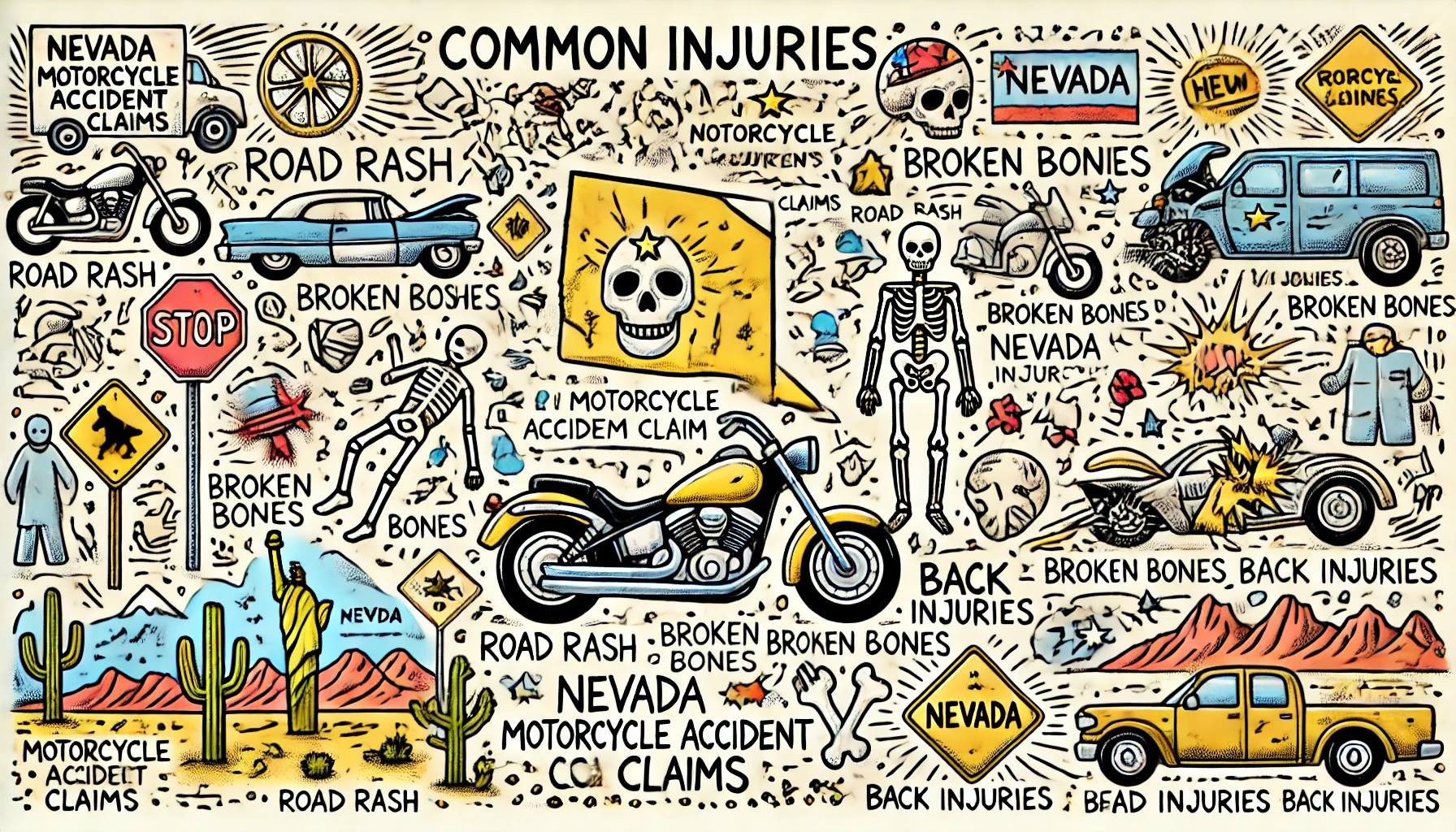
Common motorcycle accident injuries in Nevada
Head injuries and brain trauma
Even with helmets, motorcyclists can suffer concussions or severe brain damage. These injuries can affect your memory, concentration, and emotions. Recovery can be long and challenging, often requiring extensive therapy. The impact on your quality of life can be significant, potentially affecting your ability to work or maintain relationships.
Spinal cord injuries
Damage to the spine can cause partial or complete paralysis. The location of the injury determines its impact – higher injuries can affect arms and breathing. These injuries often lead to lifelong care needs and significant lifestyle changes. Adapting to life after a spinal cord injury may require home modifications and specialized equipment.
Broken bones
Fractures in arms, legs, ribs, or collarbones are common. They can range from simple breaks to complex fractures requiring surgery. Recovery often involves physical therapy and time off work, leading to financial strain. In some cases, complications like infections or improper healing can lead to chronic pain or reduced mobility.
Road rash and burns
Skin contact with the road can cause painful abrasions called road rash. Severe cases may need skin grafts and can lead to infections or permanent scarring. Burns from motorcycle fires or chemical spills are also possible, requiring specialized treatment. Long-term effects can include increased sensitivity to temperature and sunlight, as well as reduced flexibility in the affected areas.
Neck injuries
Whiplash is common and can cause long-lasting pain and limited mobility. More severe neck injuries might involve vertebrae fractures, potentially leading to chronic pain or nerve damage. Some neck injuries can also affect the spinal cord, leading to more serious complications like partial paralysis or difficulty with fine motor skills.
Amputations
In severe crashes, limbs may be severed or damaged beyond repair. This life-altering injury requires long-term medical care, prosthetics, and significant lifestyle adjustments. Ongoing challenges may include phantom limb pain, the need for regular prosthetic fittings, and adapting to new ways of performing daily tasks.
Facial and dental injuries
Impacts can break facial bones or damage teeth. These injuries often require reconstructive surgery or dental work, which can be expensive and affect self-esteem. Beyond the physical aspects, facial injuries can lead to emotional trauma and social anxiety, sometimes requiring psychological support.
Pelvic injuries
Fractures in the pelvis are serious and painful. They can damage internal organs and often require surgery. Recovery is typically slow and may involve extended bed rest. Complications from pelvic injuries can include chronic pain, sexual dysfunction, and difficulty walking or sitting for extended periods.
Muscle and ligament damage
Tears in muscles or ligaments can cause significant pain and limited movement. Recovery often involves physical therapy and can take months, affecting your ability to work and enjoy daily activities. In some cases, particularly with severe tears, surgery may be necessary, and there might be a risk of developing chronic conditions like arthritis.
Explore the different Las Vegas motorcycle crash injuries and how they may affect your injury claim. Find out how thoroughly documenting your injuries can boost your claim’s strength and potential compensation. Call (702) 867-8900 today to schedule a free consultation with one of our Las Vegas motorcycle accident lawyers.
Drive to our office and speak with motorcycle accident lawyers now
Plan driving routeNevada motorcycle accident FAQs
Is lane splitting on a motorcycle legal in Nevada?
No, lane splitting is illegal in Nevada. Motorcyclists must follow the same lane rules as other vehicles on the road.
Do you have to wear a motorcycle helmet in Nevada?
Yes, Nevada law requires all motorcycle riders and passengers to wear helmets that meet U.S. Department of Transportation standards, regardless of age or experience.
How much is my motorcycle accident case worth?
The value of a motorcycle accident case in Nevada varies based on factors such as medical expenses, lost wages, property damage, pain and suffering, and potential permanent disabilities. Consult with a personal injury attorney for a detailed evaluation of your specific case.
What should you do after a motorcycle crash?
Key steps include: 1) Ensure safety, 2) Call emergency services, 3) Exchange information, 4) Document the scene, 5) Gather witness statements, 6) Avoid discussing fault, 7) Notify insurance, and 8) Seek medical attention.
How can I prove liability for my motorcycle accident claim?
Proving liability involves demonstrating the other party’s negligence. Key evidence includes police reports, witness statements, traffic camera footage, and physical evidence from the accident scene. Typically, this is accomplished by your attorneys.
Who is usually at fault in a vehicle-motorcycle collision?
Fault in vehicle-motorcycle collisions is determined case-by-case based on evidence of negligence. Nevada follows comparative negligence rules, where compensation may be reduced by one’s own percentage of fault.
What are the most common causes of motorcycle accidents in Las Vegas?
Common causes include left-turn accidents, speeding, impaired driving, distracted driving, poor road conditions, inexperienced drivers or riders, and failure to yield.
What is the statute of limitations for filing a motorcycle accident lawsuit in Las Vegas?
In Las Vegas, Nevada, you have two years from the date of the accident to file a personal injury claim and three years for a property damage claim related to a motorcycle accident. Call (702) 867-8900 today to schedule a free consultation with one of our Las Vegas motorcycle accident attorneys.
Our Las Vegas personal injury practice areas
Las Vegas personal injury lawyers
Comprehensive legal representation for all injury types with proven strategies to maximize your compensation and hold negligent parties accountable.
Las Vegas car accident lawyers
Skilled representation for victims of auto collisions seeking maximum compensation for medical bills, lost wages, and pain and suffering.
Las Vegas truck accident lawyers
Expert attorneys handling complex commercial vehicle cases involving federal regulations, corporate defendants, and catastrophic injuries.
Las Vegas slip and fall attorney
Premises liability experts who hold property owners accountable for dangerous conditions, inadequate warnings, and negligent maintenance.
Las Vegas sexual assault lawyers
Compassionate, confidential representation for survivors seeking justice and compensation with the respect and dignity you deserve.
Las Vegas bus accident lawyers
Specialized representation for complex cases involving commercial carriers, government entities, and multiple liable parties.
